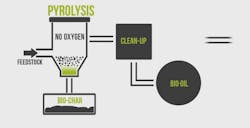Klean Industries working on $100M Used Tire Pyrolysis plant in Australia
The plant will recover carbon black and biofuel from waste tires. The plant will be integrated with Klean’s proprietary tire char upgrading technologies, enabling the transformation of low-value tire char into high-value carbon black replacements.
These carbon black replacements can be used in place of Virgin Carbon Black by 10% to 100%, depending on the application.
Pyrolysis is a non-combustion heat treatment that chemically decomposes waste material by applying direct or indirect heat to the waste material in an oxygen-free environment.
Klean claims that its CBk KleanCarbon uses 90% less water and emits more than 90% fewer greenhouse gas emissions compared to virgin carbon black. The CBk KleanCarbon has unique physical properties and performance characteristics, offering significant cost advantages and improving the environmental and function performance.
CBk KleanCarbon ensures a reduction in carbon emissions of less than 450 kg of carbon emission per metric ton of recovered carbon black.
“It is with great excitement that we announce this project and partnership with Klean Industries. Through a long process, we are committed to realizing this facility that we see combines the world’s best practices with local knowledge to solve one of Victoria’s most troublesome waste streams. The concept of waste-to-commodity recycling is something that fits within our vision to become a truly circular economy business that provides real and positive outcomes to our communities.”, said Matt Skidmore City Circle Group CEO.
The project is expected to cost $100 million and take approximately 12 to 18 months to complete.
About the Author
EnergyTech Staff
Rod Walton is head of content for EnergyTech.com. He has spent 17 years covering the energy industry as a newspaper and trade journalist.
Walton formerly was energy writer and business editor at the Tulsa World. Later, he spent six years covering the electricity power sector for Pennwell and Clarion Events. He joined Endeavor and EnergyTech in November 2021.
He can be reached at [email protected].
EnergyTech is focused on the mission critical and large-scale energy users and their sustainability and resiliency goals. These include the commercial and industrial sectors, as well as the military, universities, data centers and microgrids.
Many large-scale energy users such as Fortune 500 companies, and mission-critical users such as military bases, universities, healthcare facilities, public safety and data centers, shifting their energy priorities to reach net-zero carbon goals within the coming decades. These include plans for renewable energy power purchase agreements, but also on-site resiliency projects such as microgrids, combined heat and power, rooftop solar, energy storage, digitalization and building efficiency upgrades.

